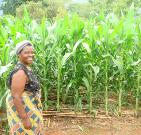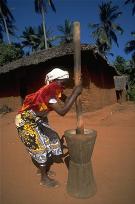Phalula Group Village, Malawi
Jo Thomas (UK/Malawi, ) Sustainable Livelihoods Programme Coordinator, Malawi for Concern Universal, and Marina France (US) Rights and Resources Group, began developing a food insecurity project in May in the Phalula Group Village in Malawi. 770 families of the Phalula Group Village face food insecurity as a result of land degradation/soil erosion/declining soil fertility, as well as climate change related unreliable rainfall patterns.
| Sustainable: mono culture maize? |
|
 |
They discovered several very interesting background papers to help developed their program designs: |
ICRAF: Farming Trees, Banishing Hunger
IFPRI: Micro-level Practices to Adapt to Climate Change for African Small-scale Farmer
IFPRI: Are Soil and Water Conservation Technologies a Buffer Against Production Risk in the Face of Climate Change?
| A woman in the village grinding maize |
|
 |
After a thorough literature review and discussions with colleagues they developed their project using two compatible programs–a conservation agriculture program and agroforestry income generation program. Their agroforestry income generation program looks first at identifying markets before choosing agricultural products to plant. |
Agroforestry Income Generation Program [Solution to underlying causes: Declining soil fertility and lack of income generation opportunities]:
[Activity 1]. Introduction of VNRMC members to agroforestry concepts
[Activity 2]. Survey local/regional businesses that buy and sell agroforestry agricultural produce in order to determine products they need on a routine basis
[Activity 3]. Establish a market link and ask the businesses for their help in training programs for farmers to grow the products they need
[Activity 4]. Using this input, launch training workshops on improved agroforestry/agricultural practices for these new crops
[Activity 5]. Deliver seeds
[Activity 6]. Establishment of village tree nursery
Their conservation agriculture program places importance on collecting traditional knowledge and on establishing pilot plots for the demonstration of improved cultivation practices:
Conservation Agriculture [Solution to underlying cause: soil erosion & land degradation and Climate Change related unreliable rainfall patterns]
[Activity 1]: Surveys and interviews to collect traditional knowledge on agriculture, changes in agricultural cycles, vulnerabilities and coping strategies
[Activity 2]: Develop plan that combines resilient and improved agricultural techniques with traditional knowledge for an overall improvement in productivity
[Activity 3]: Establish pilot plots demonstrating better cultivation practices (probably in community land)
[Activity 4]: Farmer workshops on soil restoration and conservation techniques
[Activity 5]: Farmer workshops on water conservation and management techniques
Download their report and project outline here:
Needs assessment with photos
Solution Oriented Project Outline
Would you like to learn how to develop Community Based Adaptation Projects?
Please write us with your stories, thoughts and comments through Online.Learning@csd-i.org